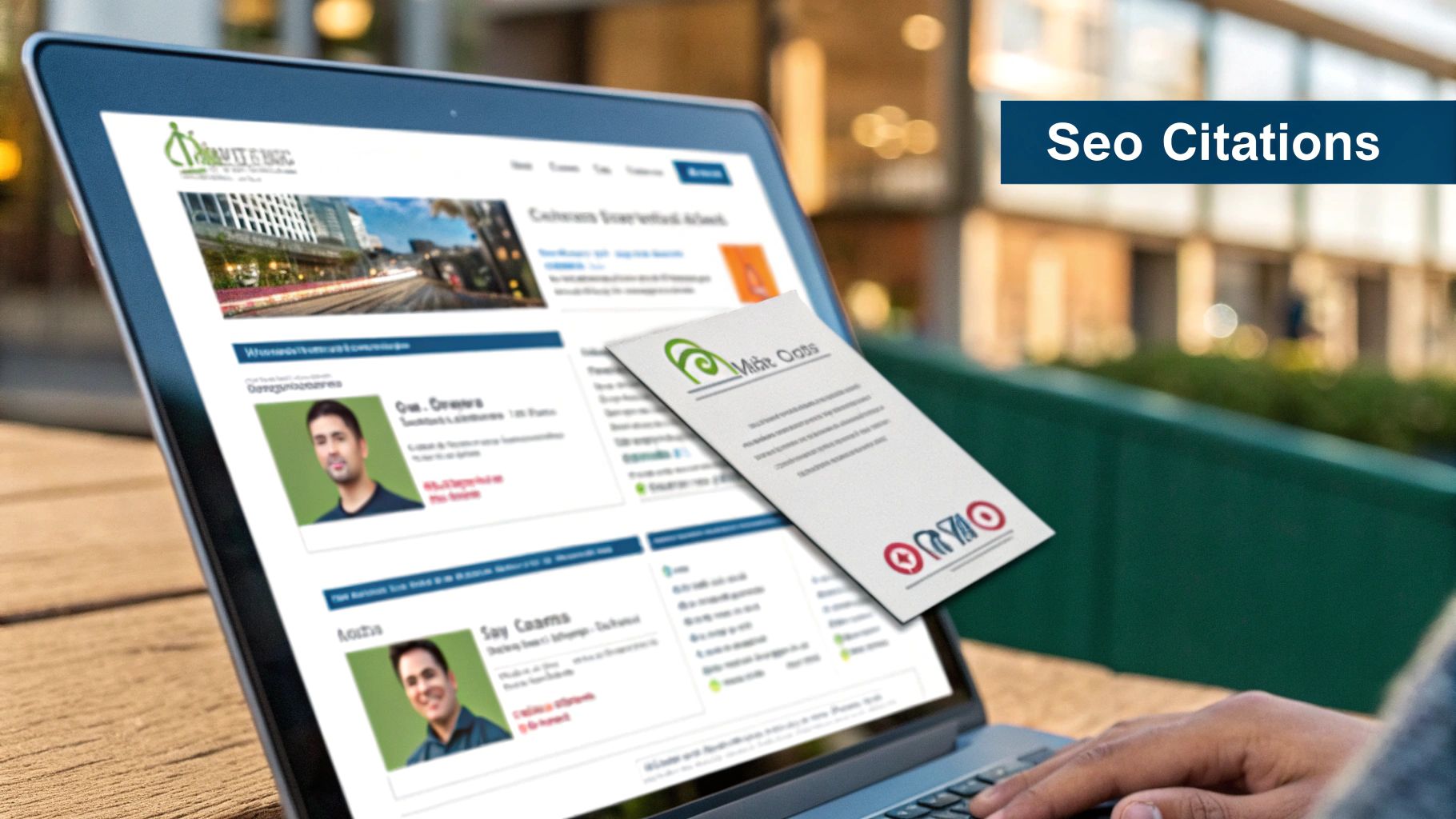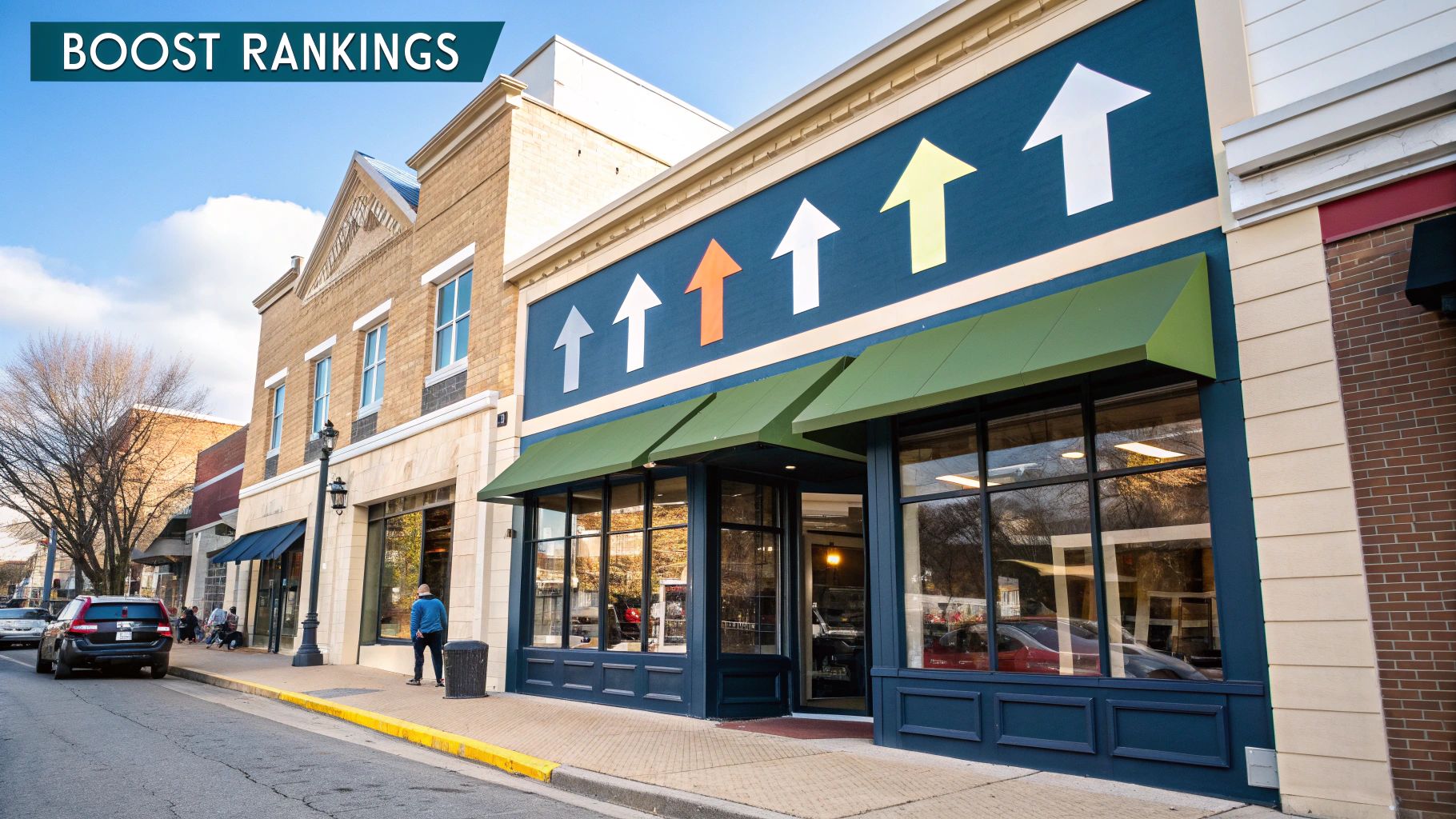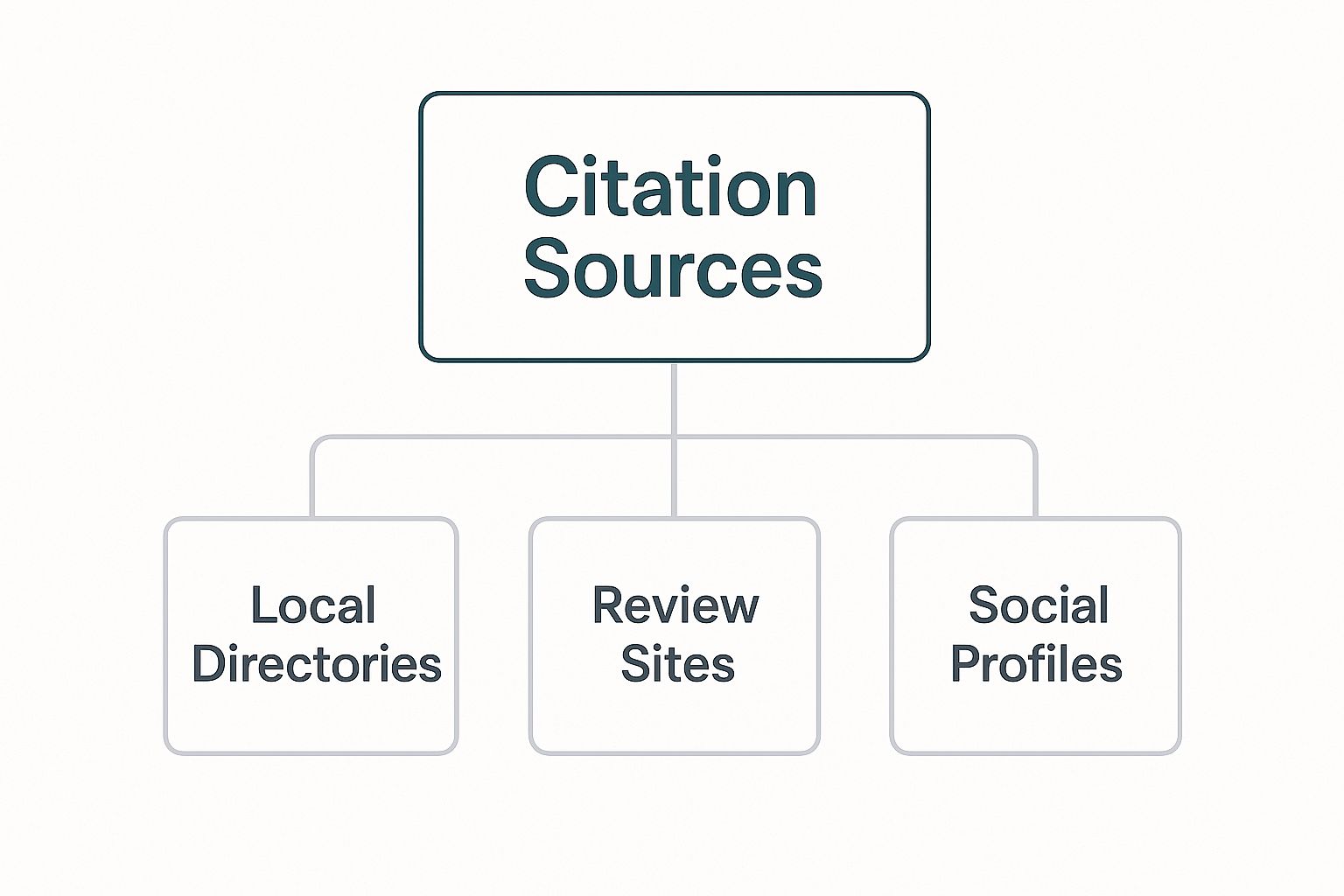Alright, let's strip away the jargon and get straight to what SEO citations are all about. At their core, SEO citations are simply online mentions of your business's key information: its Name, Address, and Phone number (NAP).
Think of them like digital breadcrumbs. Each time your business details appear on a reputable website, you're leaving a trail that helps both customers and search engines find their way straight to your door.
What Citations Really Do for Your Business

Every time your business gets a shout-out on a trustworthy site—whether it's a profile on Yelp, a listing in a local business directory, or even a mention on an industry-specific page—it’s like a little vote of confidence. It's a signal to the search engines.
This process tells Google, 'Hey, this business is legitimate. It's really located where it claims to be, and it's an active part of the local scene.' This kind of verification builds a ton of trust, which is the absolute foundation of good local SEO.
Essentially, these online references help search engines confirm that your business is real and operational. Having your details listed accurately and consistently across these important platforms is what gives you a fighting chance to show up in that coveted local search pack on Google. You can find some great insights on the importance of building citations over at Diggity Marketing.
The Core Components of an SEO Citation
To get the most out of your citations, you need to know what information actually matters. While NAP is the heart of it, a complete citation often includes a bit more detail.
| Component | Description | Example |
|---|---|---|
| Business Name | Your official, legal business name. | "Joe's Pizza Parlor" |
| Physical Address | The full, correct street address. | "123 Main Street, Anytown, USA 12345" |
| Phone Number | Your primary local business phone number. | "(555) 123-4567" |
| Website URL | A direct link to your website's homepage. | "https://www.joespizzaparlor.com" |
Getting these four elements right is the key to building a strong and consistent online presence.
Why NAP Consistency is a Game-Changer
This simple idea of "NAP consistency" is actually a powerhouse signal for verifying your business online. When Google crawls the web and finds your exact same name, address, and phone number on dozens of different sites, it becomes very confident that your information is correct and reliable.
This consistency is crucial for a few big reasons:
- It Establishes Trust: Consistent data tells search engines your information is accurate and you're a legitimate operation.
- It Builds Relevance: Getting mentioned on local blogs or industry-specific directories proves your relevance to a specific area and business category.
- It Improves Visibility: All that trust and relevance directly translates into higher rankings in local search results.
On the flip side, inconsistent or flat-out wrong information creates chaos. If one directory has an old address while another has a typo in your business name, it tanks the trust search engines have in you. This can sink your rankings and lead to frustrated customers who can't find your location.
Here's a simple way to think about it: if ten friends all give you the exact same address for a party, you’ll head there without a second thought. But if you get three different addresses? You'll be confused and probably just stay home. That's exactly how Google feels about your citations.
Why Citations Are So Important for Local Search

It’s easy to think of citations as just another online listing, but they're one of the most fundamental parts of a solid local SEO plan. The best way to understand them is to think of each citation as a vote of confidence for your business.
When search engines like Google crawl the web and find your exact Name, Address, and Phone number (often called your NAP) on multiple trustworthy sites, it tells them your business is legitimate and your information is correct. This trust is a huge factor in how you rank.
A strong, consistent citation profile directly boosts your chances of showing up in the Google local pack and on map results. That’s prime real estate for any local business trying to catch the eye of nearby customers. Essentially, every consistent mention of your business backs up the information on your Google Business Profile, making it a non-negotiable part of earning that coveted visibility.
How Citations Help Customers Find You
Citations do more than just impress Google; they create new pathways for actual customers to discover you. While many people start their search on Google, plenty of others go directly to specialized directories or review sites they already trust.
Think about it. Someone looking for a reliable plumber might skip Google and head straight to the Better Business Bureau website. If your business is listed there, you've just found a new lead—no Google search required. This is why having a presence on platforms like Yelp or industry-specific directories is so valuable; it expands your reach to where your customers are already looking.
Ultimately, citations build a robust and trustworthy online identity for your business. They work alongside all the other key factors in local SEO to paint a complete picture for search engines and customers. By making sure your business information is accurate and widespread, you're laying the foundation of trust you need to win.
To see how this fits into a broader plan, take a look at our guide to building a winning local SEO strategy in Houston.
Structured vs. Unstructured Citations: What's the Difference?

When we talk about citations in local SEO, it's not a one-size-fits-all situation. They generally come in two flavors, and knowing the difference is key to building a powerful local search strategy. Let's break them down.
Structured Citations: The Foundation
First up, we have structured citations. The easiest way to think about these is as your company's official online business card. They’re found on dedicated business directories and platforms where your information is neatly organized.
Think of sites like Yelp, the Better Business Bureau, or even your own Facebook business page. You enter your Name, Address, and Phone number (NAP) into specific, pre-defined fields. This consistent, predictable format makes it incredibly simple for search engines to crawl and confirm your business details. Getting these right is ground zero for local SEO.
Unstructured Citations: The Organic Mentions
Then there are unstructured citations. These are the more natural, organic mentions of your business that pop up in the wild. Imagine a local news site covering your charity drive, or a popular food blogger writing a rave review about your restaurant.
An unstructured citation is like a respected colleague casually name-dropping you in a conversation. It's an authentic nod that search engines see as a powerful endorsement.
These mentions might just include your business name and town, but their value is immense. Here's why they matter so much:
- Context is King: They show up within relevant articles, blog posts, or event listings, giving search engines a much richer understanding of what you do.
- Borrowed Authority: When a high-authority site like a news outlet or an industry blog mentions you, some of their credibility rubs off on your business.
- Real-World Proof: Unlike a directory listing you built yourself, these mentions are third-party validations. They signal to Google that you're a legitimate, active part of your local community.
Ultimately, a truly effective citation profile needs a healthy mix of both. The structured listings build a rock-solid foundation of consistent NAP data. Meanwhile, the unstructured mentions add powerful, context-rich signals that tell search engines you’re not just listed—you’re relevant.
Where to Build Your Most Impactful Citations
Okay, so you understand what citations are. But where do you actually build them to get the best bang for your buck? Just scattering them randomly across the web is a surefire way to waste a lot of time and energy.
The key is to be strategic. It's about quality over quantity. Think of it like building a house—you pour the strong foundation first before you start worrying about the paint color. Let's walk through the right way to build your citation profile, starting with the most powerful sources.

Start with the Big Players: Data Aggregators
Your first stop should always be the major data aggregators. These are the big data companies—think Data Axle or Foursquare—that essentially act as wholesalers for business information. They collect and verify your business details, then syndicate that data out to a massive web of other sites, directories, and apps.
Getting your info right with the aggregators is a huge shortcut. With a single submission, you can push your correct NAP (Name, Address, Phone Number) out to hundreds of different online platforms, many of which you’d never find on your own. It's the quickest, most efficient way to lay a broad foundation for your online presence.
Focus on Core Directories and Niche Sites
With that foundation in place, it’s time to focus on the heavy hitters: core local and national directories. We're talking about the household names customers actually use to find businesses, like Yelp or the Better Business Bureau (BBB). Being listed here isn't just good for SEO; these sites can send real, paying customers your way.
Finally, you need to drill down and get specific. Look for niche and hyper-local sources that are directly relevant to what you do and where you do it. This could be anything from your local chamber of commerce website to a specialized directory for your industry.
These hyper-local citations are incredibly powerful. They send a crystal-clear signal to Google that you’re a legitimate, trusted part of a specific local community or industry.
To help you organize this, think of citation sources in tiers. Each tier serves a different purpose, but all are important for building a robust local SEO presence.
Citation Source Tiers for Local SEO
| Source Tier | Description | Examples |
|---|---|---|
| Tier 1: Major Data Aggregators | The foundation. These sources distribute your data across a vast network of other sites, amplifying your reach. Get these right first. | Foursquare, Data Axle, Neustar Localeze |
| Tier 2: Core Search & Social Platforms | High-authority platforms that users actively search on. These are non-negotiable for visibility and credibility. | Google Business Profile, Apple Maps, Facebook, Yelp, BBB |
| Tier 3: Niche & Local Directories | Industry-specific and location-specific sites that prove your relevance to a particular community or field. | Chamber of Commerce, industry associations, local news sites |
By working through these tiers, you're not just building citations—you're telling a story of relevance and authority to search engines.
This tiered approach is what makes citations a cornerstone of local search. They provide the third-party proof Google needs to trust that your business is real and located where you say it is. Sticking to a structured plan is the best way to build a powerful online presence, and our local SEO checklist can help you stay on track.
A Practical Guide to Building and Managing Citations

Alright, let's move from theory to practice. This is where the rubber meets the road and where a bit of focused work can make a huge difference in your local search rankings. Managing your citations isn't overly complex, but you absolutely need a consistent, step-by-step process.
Your first move is to perform a citation audit. Think of it as a digital treasure hunt for every mention of your business online. You’re specifically looking for ghosts of business past—old addresses, wrong phone numbers, or slight name variations that are confusing search engines and hurting your credibility.
Create a Single Source of Truth
Before you touch a single listing, you need to establish your "golden record." This means creating one master document with the single, official version of your NAP (Name, Address, Phone number). Write it down once and treat it as gospel.
This master document is your North Star for all citation work. It eliminates guesswork and ensures every listing you build or claim from this point forward strengthens your online authority, rather than diluting it.
With your master NAP in hand, you can start the hands-on work of claiming and building citations on the most important platforms. Begin with the heavy hitters: your Google Business Profile, then core directories like Yelp and the BBB, and finally, those niche sites specific to your industry.
When to Use Citation Building Services
Building out citations one by one is effective, but let's be honest—it's a real time-sink. This brings you to a classic crossroads: do you go the DIY route or bring in a paid service?
- DIY Approach: This is a fantastic choice if you have more time on your hands than budget. It gives you total control over the process, but you have to be meticulous about tracking your work.
- Paid Services: For those who need to scale quickly or manage multiple locations, services like BrightLocal or Semrush are lifesavers. They can save you dozens of hours and ensure everything is done right.
Which path you take really comes down to your available resources. Both approaches work toward the same goal: a clean, consistent, and powerful citation profile. A well-maintained profile is a cornerstone of many long-term SEO enhancement strategies that fuel real local growth.
Common Questions About SEO Citations
As you start working on your local SEO, you’ll probably find yourself asking the same questions many business owners do. Getting the hang of citations can feel a bit tricky at first, but clearing up these common points of confusion will give you the confidence to manage your online presence like a pro.
Let's dig into some of the most frequent questions we hear.
How Long Does It Take for Citations to Work?
It’s natural to want to see results right away, but when it comes to citations, patience is key. You won't see a jump in rankings overnight. It usually takes anywhere from a few weeks to several months for search engines to find, index, and start giving you credit for new listings.
The speed really depends on how authoritative the directory site is and how often Google’s bots swing by to check for updates. Think of it as a long-term investment; consistent, steady effort is what builds lasting authority and better local rankings.
Are Citations Still Important with a Strong Google Business Profile?
Yes, 100%. Think of it this way: your Google Business Profile is what you say about your business. Citations are what other websites across the internet are saying about you. They act as third-party proof that your business is legitimate and that its information is correct, which builds a massive amount of trust with Google.
If your competitors are building a solid network of consistent citations and you're only relying on your GBP, you're leaving a huge opportunity on the table. They work hand-in-hand, much like how great content and a technically sound website are both essential for what is on-page SEO.
Your Google Business Profile is your most important single citation, but its power is amplified by dozens of other consistent listings across the web.
What Should I Do First If My Business Moves?
Updating your information after a move is mission-critical. An old address or phone number floating around online is a recipe for confusing Google and losing customers.
Your first move—pun intended—is to update the primary sources of truth: your own website and your Google Business Profile. Get those right immediately. After that, you need to start a "citation cleanup," which means methodically going through all your existing online listings and updating them with the new information. Start with the most important directories and work your way down to maintain your SEO momentum.
Should I Pay for a Citation Building Service?
Honestly, this comes down to a simple trade-off: your time versus your money. Building citations manually works perfectly well, but it is a slow, meticulous process. If you have a small budget but can carve out the hours, the DIY approach is a great option.
However, if you're managing multiple locations or your time is better spent running your business, a reputable service is a fantastic investment. They can ensure everything is done accurately and consistently at a scale that would take you dozens of hours to do yourself.
At Bruce and Eddy, we build powerful websites and execute SEO strategies that get you noticed. If you need a partner to handle your digital presence from design to local rankings, visit us at https://www.bruceandeddy.com.
